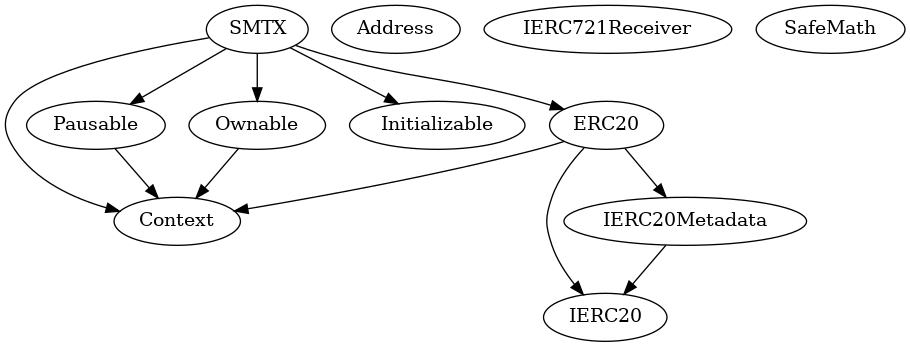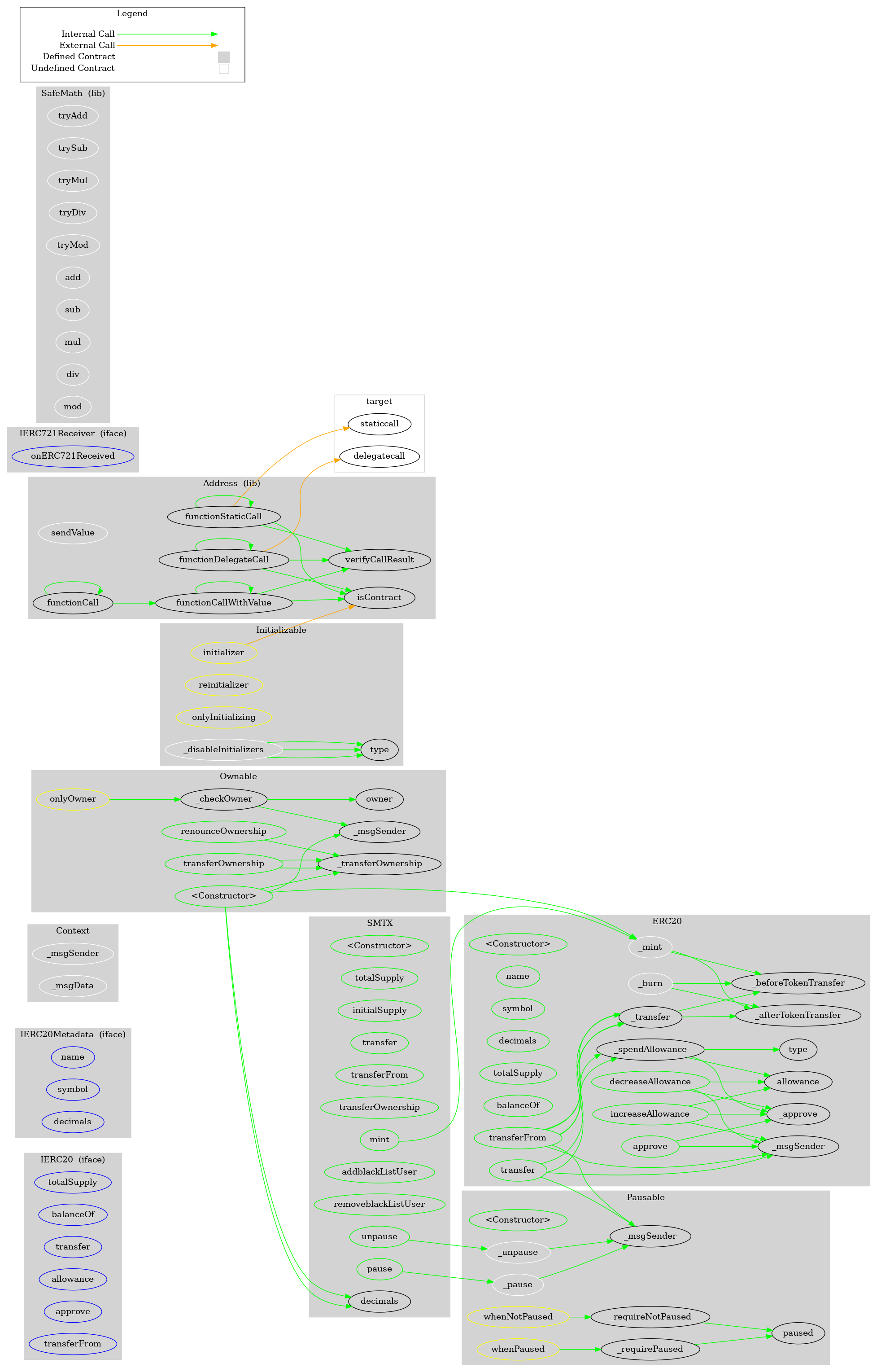SUMOTEX
Smart Contract Audit Report
Audit Summary
 SUMOTEX is a new ERC-20 token on Ethereum.
SUMOTEX is a new ERC-20 token on Ethereum.
For this audit, we reviewed the project team's SMTX contract at 0x2BC74faC9524d1c288867B948B88F4De5076fA5a on the Ethereum Mainnet.
Audit Findings
Informational findings were identified and the team may want to review them. In addition, centralized aspects are present.
Date: September 7th, 2022.
Updated: September 13th, 2022 to reflect the project's newly deployed Mainnet address.
Updated: January 21st, 2023 to reflect the project's newly deployed Mainnet address.Finding #1 - SMTXToken - High (Resolved)
Description: The _mint() function updates the_balancesvalue for the user and_totalSupplyafter tokens are minted. However, the balanceOf() function returns the user'sbalancesvalue, and the totalSupply() function returnstotalSupply_.
Risk/Impact: Tokens can never exist as the total supply and the user's balance is not properly updated.function _mint(address account, uint256 amount) internal virtual { ... _totalSupply += amount; unchecked { _balances[account] += amount; } } ... function totalSupply() public view override returns (uint256) { return totalSupply_; } ... function balanceOf(address _owner) public view override returns (uint256 balance) { return balances[_owner]; }
Recommendation: The team should consistently use either_balancesorbalancesand either_totalSupplyortotalSupply_in all relevant locations throughout the contract.
Resolution: The team has implemented the above recommendation.
Finding #2 - SMTXToken - High (Resolved)
Description: A transferFrom() transaction will never successfully execute as there is no way to increase a spender'sallowedvalue in the contract. The _approve() function instead increases a spender's_allowancesvalue which is not used.
Risk/Impact: A transferFrom() transaction will never successfully execute.function transferFrom( address _from, address _to, uint256 _value ) public override whenNotPaused returns (bool) { require(_value <= allowed[_from][msg.sender]); ... } ... function _approve( address owner, address spender, uint256 amount ) internal virtual { ... _allowances[owner][spender] = amount; emit Approval(owner, spender, amount); }
Recommendation: The team should consistently use eitherallowedor_allowancesin all relevant locations throughout the contract.
Resolution: The team has implemented the above recommendation.
Finding #3 - SMTXToken - Medium (Resolved)
Description: Although the transfer(), transferFrom(), mint(), addblackListUser(), removeblackListUser() functions use thewhenNotPausedmodifier, a function does not exist to pause/unpause the contract.
Risk/Impact: The contract can never be paused by the team.
Recommendation: The team should add a function that allows them to pause/unpause the contract or should remove the modifier altogether.
Resolution: The team has added two functions that allow them to pause and unpause the contract.
Finding #4 - SMTXToken - Informational
Description: Although the SafeMath library is utilized, the contract is implemented with Solidity v0.8.x which has built-in overflow checks.
Recommendation: SafeMath could be safely removed to reduce contract size, deployment costs, and gas costs on all transactions that utilize it.
Contract Overview
- The initial supply is set to zero upon deployment.
- The maximum supply of the token is set to 1 billion [1,000,000,000] $SMTX.
- The owner can mint tokens to any address up to the maximum supply at any time.
- No burn functions are accessible, though the circulating supply can be decreased by sending tokens to the 0x..dead address.
- The owner can blacklist any address from being able to participate in transfers at any time.
- The owner can pause/unpause the contract at any time which disables all transfers, minting, and blacklisting.
- The contract utilizes the SafeMath library to protect against overflows/underflows.
- The contract complies with the ERC-20 token standard.
Audit Results
| Vulnerability Category | Notes | Result |
|---|---|---|
| Arbitrary Jump/Storage Write | N/A | PASS |
| Centralization of Control |
|
WARNING |
| Compiler Issues | N/A | PASS |
| Delegate Call to Untrusted Contract | N/A | PASS |
| Dependence on Predictable Variables | N/A | PASS |
| Ether/Token Theft | N/A | PASS |
| Flash Loans | N/A | PASS |
| Front Running | N/A | PASS |
| Improper Events | N/A | PASS |
| Improper Authorization Scheme | N/A | PASS |
| Integer Over/Underflow | N/A | PASS |
| Logical Issues | N/A | PASS |
| Oracle Issues | N/A | PASS |
| Outdated Compiler Version | N/A | PASS |
| Race Conditions | N/A | PASS |
| Reentrancy | N/A | PASS |
| Signature Issues | N/A | PASS |
| Unbounded Loops | N/A | PASS |
| Unused Code | N/A | PASS |
| Overall Contract Safety | PASS |
Inheritance Chart

Function Graph

Functions Overview
($) = payable function
# = non-constant function
Int = Internal
Ext = External
Pub = Public
+ [Int] IERC20
- [Ext] totalSupply
- [Ext] balanceOf
- [Ext] transfer #
- [Ext] allowance
- [Ext] approve #
- [Ext] transferFrom #
+ [Int] IERC20Metadata (IERC20)
- [Ext] name
- [Ext] symbol
- [Ext] decimals
+ Context
- [Int] _msgSender
- [Int] _msgData
+ ERC20 (Context, IERC20, IERC20Metadata)
- [Pub] #
- [Pub] name
- [Pub] symbol
- [Pub] decimals
- [Pub] totalSupply
- [Pub] balanceOf
- [Pub] transfer #
- [Pub] allowance
- [Pub] approve #
- [Pub] transferFrom #
- [Pub] increaseAllowance #
- [Pub] decreaseAllowance #
- [Int] _transfer #
- [Int] _mint #
- [Int] _burn #
- [Int] _approve #
- [Int] _spendAllowance #
- [Int] _beforeTokenTransfer #
- [Int] _afterTokenTransfer #
+ Ownable (Context)
- [Pub] #
- [Pub] owner
- [Int] _checkOwner
- [Pub] renounceOwnership #
- modifiers: onlyOwner
- [Pub] transferOwnership #
- modifiers: onlyOwner
- [Int] _transferOwnership #
+ [Lib] Address
- [Int] isContract
- [Int] sendValue #
- [Int] functionCall #
- [Int] functionCall #
- [Int] functionCallWithValue #
- [Int] functionCallWithValue #
- [Int] functionStaticCall
- [Int] functionStaticCall
- [Int] functionDelegateCall #
- [Int] functionDelegateCall #
- [Int] verifyCallResult
+ Initializable
- [Int] _disableInitializers #
+ Pausable (Context)
- [Pub] #
- [Pub] paused
- [Int] _requireNotPaused
- [Int] _requirePaused
- [Int] _pause #
- modifiers: whenNotPaused
- [Int] _unpause #
- modifiers: whenPaused
+ [Int] IERC721Receiver
- [Ext] onERC721Received #
+ [Lib] SafeMath
- [Int] tryAdd
- [Int] trySub
- [Int] tryMul
- [Int] tryDiv
- [Int] tryMod
- [Int] add
- [Int] sub
- [Int] mul
- [Int] div
- [Int] mod
- [Int] sub
- [Int] div
- [Int] mod
+ SMTX (Initializable, Context, ERC20, Ownable, Pausable)
- [Pub] #
- modifiers: ERC20
- [Pub] totalSupply
- [Pub] initialSupply
- [Pub] transfer #
- modifiers: whenNotPaused
- [Pub] transferFrom #
- modifiers: whenNotPaused
- [Pub] transferOwnership #
- modifiers: onlyOwner
- [Pub] mint #
- modifiers: whenNotPaused,onlyOwner
- [Pub] addblackListUser #
- modifiers: whenNotPaused,onlyOwner
- [Pub] removeblackListUser #
- modifiers: whenNotPaused,onlyOwner
- [Pub] pause #
- modifiers: onlyOwner
- [Pub] unpause #
- modifiers: onlyOwner
About SourceHat
SourceHat has quickly grown to have one of the most experienced and well-equipped smart contract auditing teams in the industry. Our team has conducted 1800+ solidity smart contract audits covering all major project types and protocols, securing a total of over $50 billion U.S. dollars in on-chain value!
Our firm is well-reputed in the community and is trusted as a top smart contract auditing company for the review of solidity code, no matter how complex. Our team of experienced solidity smart contract auditors performs audits for tokens, NFTs, crowdsales, marketplaces, gambling games, financial protocols, and more!
Contact us today to get a free quote for a smart contract audit of your project!
What is a SourceHat Audit?
Typically, a smart contract audit is a comprehensive review process designed to discover logical errors, security vulnerabilities, and optimization opportunities within code. A SourceHat Audit takes this a step further by verifying economic logic to ensure the stability of smart contracts and highlighting privileged functionality to create a report that is easy to understand for developers and community members alike.
How Do I Interpret the Findings?
Each of our Findings will be labeled with a Severity level. We always recommend the team resolve High, Medium, and Low severity findings prior to deploying the code to the mainnet. Here is a breakdown on what each Severity level means for the project:
- High severity indicates that the issue puts a large number of users' funds at risk and has a high probability of exploitation, or the smart contract contains serious logical issues which can prevent the code from operating as intended.
- Medium severity issues are those which place at least some users' funds at risk and has a medium to high probability of exploitation.
- Low severity issues have a relatively minor risk association; these issues have a low probability of occurring or may have a minimal impact.
- Informational issues pose no immediate risk, but inform the project team of opportunities for gas optimizations and following smart contract security best practices.
